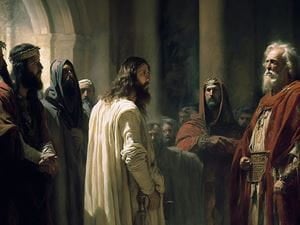
"You have the right to remain silent."
In the United States, this is a constitutional right.
But Jesus didn't have any constitutional rights at His trial. So why did Jesus choose to remain silent during His trial, a politically and religiously charged proceeding in which Jewish leaders accused Him of blasphemy and treason that led to His crucifixion?
Isaiah's Prophecy: Like a Lamb Led to the Slaughter, He Did Not Open His Mouth
Most Christians are familiar with Isaiah's prophecy that the "Suffering Servant" was despised and afflicted yet did not open His mouth (Isaiah 53:7).
Of course, Jesus' life and ministry fulfilled the prophecies of the Old Testament, so He "must" have remained silent at His trial.
Right?
Jesus Didn't Remain Totally Silent at His Trial
A review of the Gospel accounts reveals that Jesus did, in fact, speak at several points during His trial.
Jesus's "trial" included several parts:
- An initial proceeding before the Jewish religious leaders
- Hearing before Pontius Pilate
- Appearance before Herod
- Second hearing before Pilate
When the Jewish religious leaders questioned Him, Jesus generally did not answer (see Matthew 27:12; Mark 14:60-61).
However, when they asked Him if He was the Christ, He answered affirmatively (Mark 14:62; Luke 22:70).
Luke's Gospel is the only one that includes Jesus's appearance before Herod (Luke 23:6-11). Herod questioned Jesus "at length," but Jesus did not answer him at all (Luke 23:9).
In contrast with His appearances before the religious leaders and Herod, Jesus spoke quite a bit with Pilate.
John's Gospel provides key details of Jesus' responses to Pilate during His trial:
- Pilate's First Question: Pilate asked Jesus if He was "the King of the Jews." In response, Jesus questioned whether Pilate was speaking for himself or repeating what others had said. As their conversation continued, Jesus declared, "My kingdom is not of this world" (John 18:36).
- Pilate's Attempt to Release Jesus: Pilate sought to release Jesus, but the religious leaders insisted on His crucifixion, claiming, "He made Himself out to be the Son of God" (John 19:7). Disturbed by this, Pilate questioned Jesus again, asking, "Where are You from?" but Jesus remained silent (John 19:9).
- Pilate's Authority Questioned: When Pilate reminded Jesus that he had the power to either free Him or crucify Him, Jesus responded, "You would have no authority over Me at all if it had not been given to you from above" (John 19:11).
So Jesus didn't remain totally silent at His trial, but He clearly refused to answer almost all of the religious leaders' questions.
Why Did Jesus Remain Silent During His Trial?
So, if Jesus was going to speak at all, why didn't He offer a full defense to the charges against Him?
Here are some possible reasons:
He remained silent so that they could not use His own words against Him.
He would not lie – when they asked Him if He was the Son of God, He answered 'yes' (Mark 14; Luke 22). But when He could remain silent with the religious leaders, He did. After all, they had engaged in continual efforts to trap Him in His words to have some reason to accuse Him. He clearly understood what they were going to do, and nothing He said would change that. So, He may have remained silent to avoid giving them any ammunition to support their trumped-up charges.
He remained silent so as to not distract from the reality of what He was doing.
Giving a lengthy defense would divert attention away from the injustice of their actions and lend credence to the suggestion that their authority was legitimate. By refusing to answer, Jesus indicated that the trial was a sham. He would not lend His dignity to their kangaroo court by participating in the trial.
He remained silent to protect the disciples.
In the Garden, Jesus prayed: "While I was with them, I was keeping them in Your name, which You have given Me; and I guarded them, and not one of them perished except the son of destruction so that the Scripture would be fulfilled" (John 17:12). Additionally, when He was arrested, He told those who came to take Him to let His disciples go (John 18:8). And of course, Jesus had warned the disciples about what would happen when He was arrested – that they would all fall away (Matthew 26:31). Clearly, He was concerned about His disciples, and did whatever He could to keep them out of His trial.
He remained silent as a demonstration of His own power and authority.
As noted above, when Pilate questioned him, Jesus generally responded to His questions. In this way, Jesus demonstrated His power and authority – almost as though He were treating Pilate as a peer. Jesus acknowledged that He is a King, but His kingdom is not of this world. When Pilate tried to assert his authority, Jesus told him that he would have no authority over Him if it had not been given to Pilate from above.
In contrast to those discussions, Jesus generally refused to respond to the religious leaders – because He understood that they had no authority over Him. This was nothing new. On numerous occasions, they challenged His authority; in each case, He refused to accept their authority over Him.
He remained silent in fulfillment of the prophecy.
It could be misleading to say that Jesus remained silent to fulfill the prophecy. That could be interpreted to mean that He intentionally did something solely to fulfill prophecy. Such an interpretation minimizes God's power and ability to foretell events.
To put it another way, Jesus didn't say, "I have to remain silent because Isaiah prophesied that the Messiah would remain silent."
No, He remained silent because it was God's plan and desire.
God knew hundreds of years before how Jesus's trial would unfold; that's why He inspired Isaiah to prophesy that the Servant would remain silent. "He was despised and afflicted, yet He did not open His mouth; like a lamb that is led to slaughter, and like a sheep that is silent before its shearers, so He did not open His mouth" (Isaiah 53:7).
Jesus didn't have to manipulate things to fulfill prophecy; God inspired the prophets to predict how things would actually happen.
So Why Did Jesus Remain Silent During His Trial?
There is no "one" answer to this question. The reasons suggested above are all legitimate explanations for His silence.
Probably, all of those reasons (and perhaps more) help explain why Jesus did not answer His accusers.
But in the final analysis, all of those explanations are grounded in one central truth: Jesus did everything just the way God intended!

